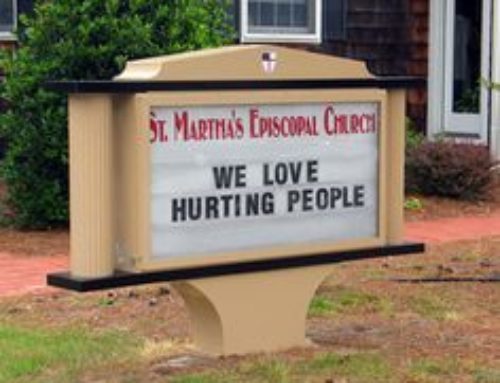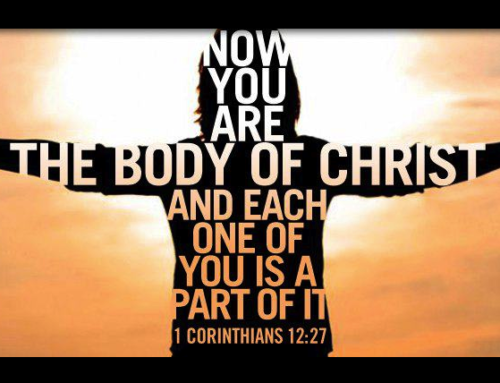#21 Trust God without a backup plan.
Sho, this is a tricky one, because it might seem to contradict Tip #4 which was about reconnecting your brain [Love God with all your mind!] and all i can say is that sometimes we have to hold seemingly contradictory ideas in tension.
The best example of this has to be in 2 Kings 4 where Elisha is confronted by the death of a child [whose birth he had prophecied into a seemingly impossible situation] and led by the Spirit, he responds in this way:
‘Then he got on the bed and lay on the boy, mouth to mouth, eyes to eyes, hands to hands. As he stretched himself out on him, the boy’s body grew warm.’ [2 Kings 4.34]
We know the story and we know how it ends and so it seems like just another great story of God showing up. But for Elisha, before he witnesses the miracle, this is the biggest ask God has put on him. He has a sense that God is telling him to do this thing, but if the miracle does not happen, this ends really badly.
Now it’s surprising – and quite a relief – to me that there haven’t been a lot of stories of christians climbing on to dead bodies and joining mouths, cos that’s how too many of us tend to treat the bible. [i guess only with verses we like, which is why ‘The Prayer of Job’ never became a best-seller]. But in this case Elisha had to be pretty darn sure that this was God telling him to do this supremely dodgy act [if it doesn’t work out] and there is no backup plan available. If God doesn’t show up, Elisha will likely be killed.
As Elijah would have been in 1 Kings 18 when he basically challenges the prophets of Baal to a duel, by fire. If Elijah’s God does not show up, he literally will be killed. But God answers by fire and we know the rest of the story.
David and Goliath, Daniel and the lions, Shadrach, Meshach and Abednego and the fiery furnace… and more. They trusted God [in a situation where i believe the Holy Spirit prompted them] and if God did not come through it would end badly.
i see too many christians today operating with a philosophy i call ‘Trust God but have a backup plan’. Where we talk about trusting God and we make some big move, but if it doesn’t happen we have insurance or savings or family connections or whatever and so we will be okay.
Proverbs 3 sets out the philosophy i try to follow: ‘Trust in the Lord with all your heart and lean not on your own understanding; in all your ways acknowledge God and God will make your paths straight.’
This is a tricky one and i’m not saying agree with me cos i say it, but it is worth wrestling with and giving some time and attention to. This passage has caused me to question having insurance and savings [For some context i now owe close to R40 000 to an insurance company for not having insurance but on the other hand a large amount of that has been covered by fellow Christ followers seeking to love neighbour as self] and asking if we can honestly say we trust God if we have all those safety nets in place. Or is it loving God with our mind that causes us to be wise with our money in that way?
i don’t think this is a straightforward one but at the very least ask the question, in community, wrestle with it, and come up with something you believe and try to live by.
For me, the Acts 2 picture of church [living in community and having everything in common] is one which might provide and alternative to insurance and medical aid and allow a community of people to live in a space of trusting God and not needing a backup plan because of the buy-in of a loving community. Common Change, that we are part of [ask us how] is another way of creativingly looking out for each other.
But when it comes to trusting God without a backup plan, i am talking more specifically about a time when God prompts you to do something. If you know God has told you to do something [Elisha and dead boy] then you can be confident in taking the risk of following God without needing a way out.
This requires time and attention given to your relationship with God so you can be listening to God when God speaks and recognise God’s voice. Which probably requires much time in the Bible and in prayer cultivating that relationship.
i think it’s possible to both use our mind to love God and to trust God without a backup plan and a healthy dose of discernment that comes from the Holy Spirit to tell the difference.
Trust God, but don’t have a backup plan!
#40TipsForChristFollowers
= = = = = = = = = = =
#22 Consider that God might be a big fan of diversity.
As a white follower of Jesus in South Africa, my personal conviction is that i cannot be part of a Sunday church congregation that is more than fifty percent white. Val and i feel the same way about the majority of spaces we visit and occupy.
But what i really would love to understand, even if just a little bit better than i do know, if you are a white person who is part of a mostly white church congregation, how does that sit well with you? How do you justify/explain it internally? What is the win or the takeaway?
In a country where white people make up less than 8% of the population, this feels less like an accident and more deliberate [somewhere along the line, if not your personal choice then why does the area you live in look so white etc]
With the work needing to be done in South Africa, this feels like such an easy one. As a follower of Jesus, your church family probably defines the majority of your relationships and so what great opportunity to build bridges and grow relationships and learn and understand differences.
Don’t feel judged by this. Feel challenged. Feel questioned. This is an opportunity to self-critique and possibly step into something new and possibly more profound, maybe even more Kingdom?
If we look at Jesus, He certainly seemed to be a big fan of diversity and specifically of calling to the front of the crowd those pushed to the margins, so children and women and Samaritans and the sick and particularly lepers. He chose a completely diverse crew of twelve to hang around with and if you don’t think so then take a bit of a closer look at Matthew the tax collector and Simon the zealot who i’m convinced Jesus would have partnered together when he sent them out in twos [although He may not have, but He definitely picked the type of people who had very different backgrounds and beliefs].
In Acts 10 we see the vision Peter has from God that opens up his theology to accept, include and welcome gentiles to what was ‘a Jewish thing’.
Galatians 3 showed that everyone was welcome into this kingdom and that the distinctions and hierarchies between people had been removed: ‘There is neither Jew nor Gentile, neither slave nor free, nor is there male and female, for you are all one in Christ Jesus.’
In Revelation 7 we are told in a vision of the future kingdom that John witnesses ‘ a great multitude that no one could number, from every nation, from all tribes and peoples and languages, standing before the throne’.
So if Jesus pursued diversity [in His followers, in the places He hung out, in the people He spent time with] and if Peter and the rest of the disciples saw the need to extend their presence and community beyond just people who looked like them, and if the future kingdom is going to be a diverse and beautiful mess of people, then surely that says something about now.
But even in the spirit of loving your neighbour as yourself and reaching out to those considered ‘the least of these’ [Matthew 22 and 25] there has to be some movement towards those who don’t look like you.
We can see that 25 years since apartheid officially fell, if it hasn’t happened naturally by now, it’s really not going to. You need to be intentional. Where do you worship? Who do you invite around your table? Where do you shop and eat and sport and play?
It would be absolutely insane to try and convince yourself for one second that if Jesus lived in South Africa today [or your country if you’re from somewhere else] that He would only hang out with white people. So how is it okay that you do?
i don’t believe you can come close to grasping what the kingdom of God is about without a sense of the diversity of its inhabitants.
Consider that God might be a big fan of diversity. And what should that mean for you?
#40TipsForChristFollowers
= = = = = = = = = =
#23 Stop picking some sins to major on over others.
While i don’t think i believe that all sins are equal [despite the church tending to say that’s the case while acting as if it’s absolutely not – when is the last time you heard someone preach against greed?] i do think it becomes problematic when we put highlight some sins to the extreme, while barely, if ever, mentioning others, despite what the bible may have to say.
This is where i have found the Beep Beep machine analogy to be particularly helpful in terms of explaining the concept. In a nutshell, if you try to take 100kg of metal through an airport metal detector or you have a 1cm by 1cm metal plate in your pinkie, either way the machine will go off. The machine was built to recognise metal, not the amount of metal.
And in that way sin can be seen as equal, because whether you were a mass murderer or whether you told one little white lie once your whole life, your sin prevents you from being made right with God and entering eternal life. So sin has equal capacity to keep us separated from God, yes.
Fortunately, God so loved the world that, knowing we would be unable to deal with our own sin, God sent Jesus into the world to die as a substitutionary sacrifice in our place and to pave the way for right and good relationship with God once more. It is by grace we have been saved, and this not from ourselves, it is a gift of God.
So no matter how many good things you do in life, they will not outweigh the smallest amount of sin, but fortunately, no matter how much bad you do in life, it will not be able to cancel out God’s grace.
However, killing someone has far-reaching consequences and so it affects much more than just the person who died. So when compared to a lie you tell to get yourself out of a speeding ticket, it is not the same. Because the far-reaching effects of the act far outweigh those of the lie.
So sin has equal capacity to break/harm our relationship with God but some sins carry with them more capacity to create a path of destruction or mess around them and can be seen as more serious.
With all that said though, if you were visiting from another planet and hung out in most churches for a year, you would likely get a very messed up idea of what sin is and isn’t. Because as the church we have tended to pick a few things and highlight them as the main sins [having sex outside of marriage, getting drunk, smoking, being gay and maybe dancing in some really conservative churches] whereas being greedy is often encouraged and even praised.
So while i don’t think all sin is equal, i definitely believe that the church has largely had a really skewed approach to the sin it speaks to and that which it omits. In fact, if you hold scripture dealing with sex offences against that which deals with failure to look after the poor and needy or failure to seek justice then there is no comparison. Some churches would go as far as trying to make you believe those things are a by-product of the gospel.
All sin has an equal effect of damaging our relationship with God, but some sins have wider and more painful consequences and should be taken more seriously.
My conclusion:
– it’s a dangerous thing if your church gathering never speaks about sin.
– it’s an incomplete picture if your church gathering goes on and on about some specific sins [which are mentioned a couple of times in the bible] while refusing to touch on the sins of injustice to the poor and marginalised or failure to steward resources well [which is mentioned throughout the bible on multiple occasions].
– it’s a dangerous thing if your church focuses on sin to the exclusion of pointing towards grace and that God has made a way for us to be freed from it.
– it’s a dangerous thing if your church focuses on grace to the exclusion of ever having to face up to, confront, or deal with your sin and the consequences thereof.
A bonus question to consider is how do i view other people’s sin in comparison to my own?
Sin comes between us and God and creates obstacles and wreckage in our relationship with God and other people. We need to deal decisively with is. Which will be my next tip. But for now, stop picking some sins to major on over others.
#40TipsForChristFollowers
= = = = = = = = = =
#24 Deal decisively with sin.
In James we read, ‘Then, after desire has conceived, it gives birth to sin; and sin, when it is full grown, gives birth to death.’ [1.15]
Sin ultimately ends in death. Every time! i don’t think enough of us get that and i certainly don’t take it seriously a lot of the time.
If we don’t deal with any of our sin then there is an eternal death and separation from God, however that looks. But even before we get there, take any sin you can think of, and continue its path unchecked and you will see that it leads to death.
A small lie leads to a bigger lie [to cover up the first one] which then leads to an even bigger lie and ultimately you will be caught out or you will have the death of trust or the death of relationship with someone or a community. And so on.
Any sin continued to its logical end results in a death of some type: physical, emotional, community, psychological, spiritual…
James describes it like the birth process, suggesting that it takes time and builds up towards a devastating climax [the phrase ‘gives birth to death’ is pretty provocative!]
While that is a negative image, it also suggests to us that we have time to put things right. We can deal decisively with sin before it gets out of control.
Ephesians reminds us to not even give the devil a foothold [4.27] and Peter reminds us why: ‘Be alert and of sober mind. Your enemy the devil prowls around like a roaring lion looking for someone to devour.’ [1:5.8]
A lot of christians if they believe in the devil [and i would suggest many don’t really believe] kind of have this idea that the devil wants to ruin my day – he wants to make me spill my coffee or give someone else my parking spot or cause me to rip my new jeans…
The bible suggests otherwise though: the devil wants to destroy you. Beyond just killing you, he wants you to lose your very soul and spend eternity with him.
The story of King David and Bathsheba in 2 Samuel 11 is a helpful one which illustrates all of these points. What was David’s first sin? Adultery? Murder? Nope, it was geography. David was in the wrong place at the wrong time and everything escalated from there.
The chapter begins: ‘In the spring, at the time when kings go off to war, David sent Joab out with the king’s men and the whole Israelite army.’
David compromised on his role as king, which led him to lust which led him to adultery which led him to deception which led him to murder. And at any point in that journey, he could have dealt decisively with sin and interrupted the chain of events that ultimately led to his son’s death.
If you’re struggling with porn, don’t hide the magazines under your bed.
If you’re an alcoholic, don’t hang around in bars.
Deal decisively with the sins you know have knocked you down in the past and will likely continue to tempt and haunt you.
And as a bonus tip, it turns out the catholics might have been right [well, about this!] because we also read in James:
‘Therefore confess your sins to each other and pray for each other so that you may be healed.’
Confession invites accountability. Sharing your struggles with someone or someones that you trust can be so helpful and can really be a part of dealing decisively with the sin that plagues you. Too many people have fallen off the bridge of ‘I’ve got this. I can do this alone!’
Deal decisively with sin.
#40TipsForChristFollowers
= = = = = = = = = = =
#25 Let go of the notion that Jesus was white. [Oh, and God is not a boy!]
For a lot of white people, i imagine this might not seem like a huge deal and if the Saviour of the Universe has been depicted looking like you your whole life then that might explain why. But given that Jesus was born in the Middle East and most likely looked like the next Middle Eastern guy, this is a helpful distinction to make.
This is a way in which whiteness [not white people, but the ideology created and proliferated by many white people that being white was somehow better than being any other shade despite race being a social construct and not an actual thing] through the vehicle of colonisation subtly continued the message that white is better [cos even Jesus is white!].
i was reminded this morning by my friend Alexa of two quotes by my friend Sivuyela Kotela from the Justice Conference last year which are just so completely powerful and worth paying attention to:
‘There is nothing inherently evil for someone of European descent to portray Jesus as white – having a picture of a white God because He is our Father. In the same way, there is nothing wrong with a black man portraying Jesus with dreadlocks.’
Food for thought. Same as the idea of referring to God as He or She when we know God is not predominantly a boy or a girl but displays attributes that we attribute to both Fathers and Mothers at different times. It helps our small minds come to grips with some kind of picture of God that we can relate a little more to. As long as we remember that’s not who God is per say.
The second quote:
‘It is easy to create God in our image. But it is much harder for God to recreate you so that you should look more like God. The question should not be: Does God look like us? But do we look like God?
It is possible by our actions to deny that God is our Father. How we treat each other denies God as Father. The power of apartheid was that it made many people doubt whether they were God’s children.’
For white males, this might be a hard but important one to grasp. People of colour have been portrayed/treated/thought of as ‘less than’ in so many places and in so many ways. The image of a white Jesus has added to that. Women have been portrayed/treated/thought of as ‘less than’ in so many places and in so many ways. The idea of God as a man has added to that.
We are all created in the image of God which suggests to me that’s not about physical attributes because God can’t be all the things. But that inside us somewhere – sometimes awake, sometimes dormant, sometimes slowly starting to stir – there is something of the essence of God, which we see most clearly in Love.
By working to dismantle notions that were not created by accident we can help those around us to see and recognise the God-image in themselves, and then from there to look around and see it in each other.
It is helpful to remember that Jesus was not white and that God is not a boy.
#40TipsForChristFollowers







Leave a Reply